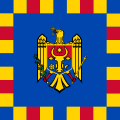Dorin Recean | |
|---|---|
 Official portrait, 2023 | |
| Special Envoy for Development and Resilience | |
| Assumed office 10 December 2025 | |
| President | Maia Sandu |
| 16th Prime Minister of Moldova | |
| In office 16 February 2023 –1 November 2025 | |
| President | Maia Sandu |
| Deputy | |
| Preceded by | Natalia Gavrilița |
| Succeeded by | Alexandru Munteanu |
| Member of the Moldovan Parliament | |
| In office 22 October 2025 –1 November 2025 | |
| Succeeded by | Igor Talmazan |
| Parliamentary group | Party of Action and Solidarity |
| Defense and National Security Advisor to the President –Secretary of the Supreme Security Council | |
| In office 7 February 2022 –16 February 2023 | |
| President | Maia Sandu |
| Preceded by | Ana Revenco |
| Succeeded by | Stanislav Secrieru |
| Minister of Internal Affairs | |
| In office 24 July 2012 –18 February 2015 | |
| President | Nicolae Timofti |
| Prime Minister | Vlad Filat Iurie Leancă |
| Preceded by | Alexei Roibu |
| Succeeded by | Oleg Balan |
| Deputy Minister of Information Technology and Communications | |
| In office 29 January 2010 –24 July 2012 | |
| President | Mihai Ghimpu (acting) Vlad Filat (acting) Marian Lupu (acting) Nicolae Timofti |
| Prime Minister | Vlad Filat |
| Minister | Alexandru Oleinic Pavel Filip |
| Personal details | |
| Born | 17 March 1974 |
| Citizenship | |
| Party | Independent |
| Other political affiliations | Party of Action and Solidarity (2025) |
| Spouse | Stella Recean |
| Children | 2 |
| Education | Academy of Economic Studies of Moldova (BA) Newport International University (MBA) |
| Occupation |
|
Dorin Recean (born 17 March 1974) is a Moldovan politician and economist who served as Prime Minister of Moldova from February 2023 to November 2025. Since 2022 he has also served as Presidential Advisor on Defense and National Security, and Secretary of Moldova's Supreme Security Council. He previously served as Minister of Internal Affairs of Moldova from July 2012 to February 2015. He has extensive experience in the private sector and in the IT industry with a specialisation in data, including big data, and information analysis. He also worked in development institutions and was previously a lecturer at several universities.
Contents
- Early life and education
- Career
- Academia
- Politics
- Premiership
- Political views
- Personal life
- Honours
- Foreign honours
- References
He is considered to be pro-Western and a strong supporter of the accession of Moldova to the European Union. [2] He has opposed and criticised Russia's involvement in the Russo-Ukrainian war and supported subsequent steps to reduce Moldova's economic dependence on Russia, expressing his sympathy and support for Ukraine in the conflict. [3] He has argued for increased military cooperation between Moldova and NATO. [4] [5]




